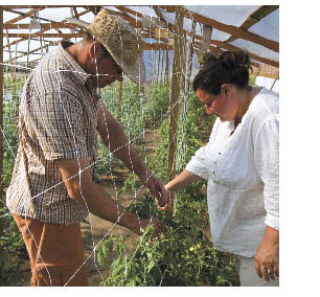Maury Island is the birthplace of a rare and beautiful beast: the Langley silver tiger. It grows tall and gangly, loves the sun and is named for its frost-kissed appearance. The tiger is a hybridized tomato plant that produces juicy red- and orange-striped fruit which ripens early and enjoys a long season, the result of cross-pollination between two parent plants — what farmer Leda Langley calls a “happy accident.”
But if you visit Langley Fine Gardens, located just up the road from Dockton on Maury Island, there’s a palpable energy in the air that can’t be explained away as mere serendipity. Maybe it comes from the simple content of people living exactly the lives they choose, or it could be thousands of plants pumping out oxygen 24-7. Whatever it is, it’s contagious, and you’ll want to take some home with you.
And Leda and Matt Langley are happy to oblige. They’ve been growing plants for others for 12 years, ever since they started sprouting seeds in their Ballard backyard for their nursery business, which now serves 29 stores from Portland to Seattle. Matt also sells their plants at the U-District and West Seattle farmers markets. Come summer, you’ll find their colorful edibles at the Vashon Farmers Market on Saturdays and, starting today, on Wednesdays from 2 to 5 p.m. in the Village Green.
You could say that their market presence is another happy accident. Although the vibrant Vashon Farmers Market exuded a “vibe” that sealed their decision to move to Maury eight years ago, the Langleys had no intention of growing food to sell there. They were busy full-time with their nursery business and a baby boy when former market manager Karen Kinney urged them to reconsider, explaining the market needed to offer more food to become viable.
“That turned into this whole crazy thing, and now it consumes our lives May through December,” said Leda, who herself is credited as the force behind the successful mid-week market. The Wednesday market customer base grew as people learned they could depend on farmers being there with their fresh-picked favorites every week rain or shine.
Long-time fans of seed catalogues and gardening books, the Langleys love trying out new plants and bringing unusual tastes to their customers. Some of the Langleys’ bestsellers are Arugula sylvetica (spicier and nuttier than its tamer cousin, Arugula sativa), Zucchetta rampicante (or Italian trombone zucchini, which holds its firm texture in a stir fry), lemongrass, Thai basil and huactay (an edible Peruvian marigold that’s great with fish). It’s not just the rare and wild that people clamor for; the Langley’s brussel sprouts are so sweet and tender that customers call ahead to reserve them by the pound.
International farm workers are responsible for introducing the Langleys to some of the more exotic of these flavors.
Leda and Matt say they couldn’t manage the work of growing and selling for the market without the help of their families and two devoted, full-time employees. This is the second year they’ve hired workers through the Multinational Exchange for Sustainable Agriculture, a program that promotes sustainable farming practices and small-scale farming by offering agriculturalists from other countries hands-on training at sustainable farms in the United States. This year they’re working with Mika Ueno from Kochi, Japan, and Susanna Davila of Lima, Peru.
“The nice thing about farmers markets is that it’s almost like we can farm ostensibly through all of our customers,” Matt said, guessing that the 20,000 tomato plants they’ve sold this year would cover about 10 acres.
The Langleys grow such unusual plants that they can spot them easily in other people’s gardens — the sticky ramble of Chilean glory vine (hummingbirds love it, and it blooms nine months of the year) or the sky-scraping Echium pininana (a borage relative from the Canary Islands that can reach heights of 18 feet).
And now their edibles are making an impression inside people’s homes.
“I tell our employees, when you’re working, it’s not the time to be daydreaming or philosophizing — you need to be focused,” she said. “The only way to make a living at this is to be very efficient.”
Leda grew up picking berries on a small farm in Oregon, where her father encouraged her to make pocket money.
“I was very focused on money for a five year old,” she said with a laugh.
This experience apparently instilled a work ethic that helps make her business a success today.
“If you have a 10-square foot garden bed and you pay $100 in wages to seed it, another $100 to weed, $25 to harvest and another $25 to get it to market … if you don’t sell those vegetables for more than $250 — then what’s the point?” Leda asked.
“Some people stay away from the farmers market because they think it’s horribly expensive, but I haven’t found that to be true. They’ve done studies at Seattle’s farmers markets and found that at least 50 percent of the stuff is less expensive than that at the grocery store,” Leda said. “You’re going to pay a premium for hand-picked peas and berries grown with organic methods, but that’s the way it goes — other things can be a bargain.”
Leda suggests that if people have questions about pricing they should take the time to talk to the farmers and learn what’s behind higher prices.
“People have a very romantic idea of farming,” she said. “Sometimes I feel like I’m working in a factory line, except it’s my factory, and I get to be outside, and I get to watch the hummingbirds.”
Fledgling Anna’s hummingbirds chase each other through a cluster of greenhouses, stopping now and then to sip from the flowers of Apricot sprite. Freddy, the Langley’s almost four-year-old son, shows off a patch of alpine strawberries, his summer favorites. Roses fill the air with delicate scents, and the mint is ready for picking in the “cocktail garden.”
This factory has its perks.


